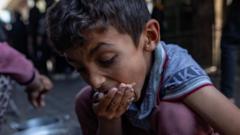As food supplies trickle into Gaza following a partial blockade lift, chaos erupts with desperate residents clashing over limited resources. Armed looting incidents and violence against aid convoys illustrate the increasing instability amidst a collapsing governance structure, raising alarm about food security for the 2.1 million people affected.
Rampant Chaos Unfolds in Gaza Amid Critical Food Shortages

Rampant Chaos Unfolds in Gaza Amid Critical Food Shortages
Desperate Gazans face escalating violence and insecurity as humanitarian aid struggles to reach those in need, revealing the depths of the crisis.
Article Text: Amidst a dire humanitarian crisis, chaos has erupted in Gaza as food supplies begin to trickle in after an Israeli blockade was partially lifted. Reports indicate that bakeries overwhelmed by desperate crowds were forced to halt distribution due to security concerns. Armed looters attempted to seize aid supplies, resulting in a firefight with Hamas security officials, which escalated as an Israeli drone struck the area, killing multiple officers.
The incident highlights the deteriorating security situation in Gaza, where civil order has collapsed, exacerbated by armed conflict. A convoy of aid trucks, organized by the World Food Programme, carrying essential supplies like flour, was intercepted by assailants in central Gaza. Witnesses reported that the Hamas security team engaged with the attackers until they themselves were targeted by Israeli air strikes.
Hamas condemned the Israeli actions, labeling the attack a "horrific massacre," while the IDF justified their involvement, stating they targeted individuals they identified as threats to humanitarian aid efforts. Despite a recent easing of the blockade allowing around 130 trucks to enter Gaza over three days, agencies warn that humanitarian needs far exceed this meager influx, with approximately 500 to 600 trucks required daily.
International organizations continue to advocate for enhanced protection of aid deliveries, as looting incidents further complicate relief efforts. The WFP noted that hunger and desperation are exacerbating security issues and called for greater measures to ensure safe passage for humanitarian supplies.
As Gazans react with frustration over the slow distribution methods, many are demanding changes to enable families to bake at home, thus reducing exposure to crowd-related violence at aid centers. The situation is particularly critical in displacement camps, where access to basic necessities, including clean drinking water and medical care, remains severely compromised.
Humanitarian leaders have expressed grave concerns that insufficient aid supplies are failing to meet the overwhelming needs of the population. For those engaged in frontline relief work, such as midwives and aid workers, the observable toll of malnutrition on families is acute, leaving them unable to support their infants due to inadequate food intake.
While some aid has made it into the region, officials from the UN have reiterated that the volume falls pitifully short of what is essential for survival. As the dire conditions continue to deteriorate, calls for immediate action and an increase in aid flow persist, with no end in sight for the suffering residents of Gaza.
The incident highlights the deteriorating security situation in Gaza, where civil order has collapsed, exacerbated by armed conflict. A convoy of aid trucks, organized by the World Food Programme, carrying essential supplies like flour, was intercepted by assailants in central Gaza. Witnesses reported that the Hamas security team engaged with the attackers until they themselves were targeted by Israeli air strikes.
Hamas condemned the Israeli actions, labeling the attack a "horrific massacre," while the IDF justified their involvement, stating they targeted individuals they identified as threats to humanitarian aid efforts. Despite a recent easing of the blockade allowing around 130 trucks to enter Gaza over three days, agencies warn that humanitarian needs far exceed this meager influx, with approximately 500 to 600 trucks required daily.
International organizations continue to advocate for enhanced protection of aid deliveries, as looting incidents further complicate relief efforts. The WFP noted that hunger and desperation are exacerbating security issues and called for greater measures to ensure safe passage for humanitarian supplies.
As Gazans react with frustration over the slow distribution methods, many are demanding changes to enable families to bake at home, thus reducing exposure to crowd-related violence at aid centers. The situation is particularly critical in displacement camps, where access to basic necessities, including clean drinking water and medical care, remains severely compromised.
Humanitarian leaders have expressed grave concerns that insufficient aid supplies are failing to meet the overwhelming needs of the population. For those engaged in frontline relief work, such as midwives and aid workers, the observable toll of malnutrition on families is acute, leaving them unable to support their infants due to inadequate food intake.
While some aid has made it into the region, officials from the UN have reiterated that the volume falls pitifully short of what is essential for survival. As the dire conditions continue to deteriorate, calls for immediate action and an increase in aid flow persist, with no end in sight for the suffering residents of Gaza.






















